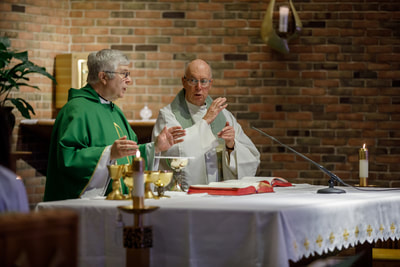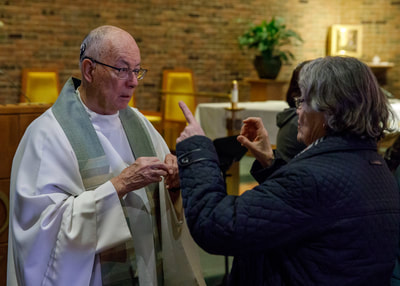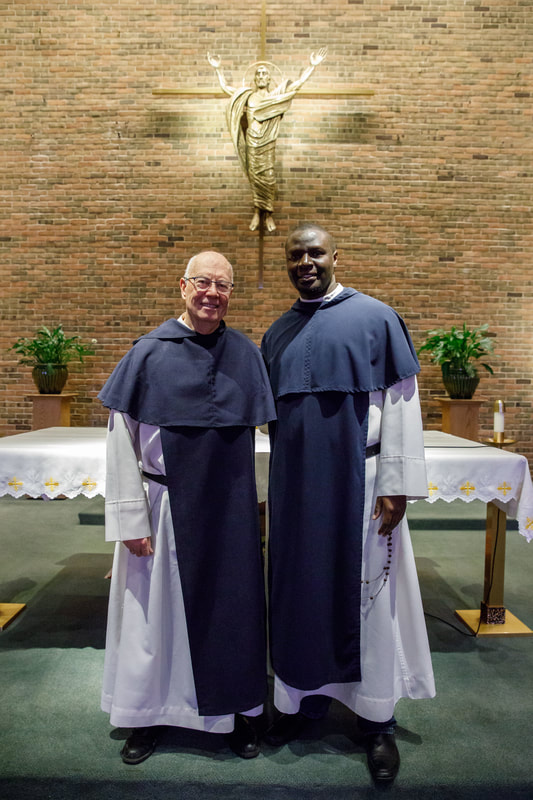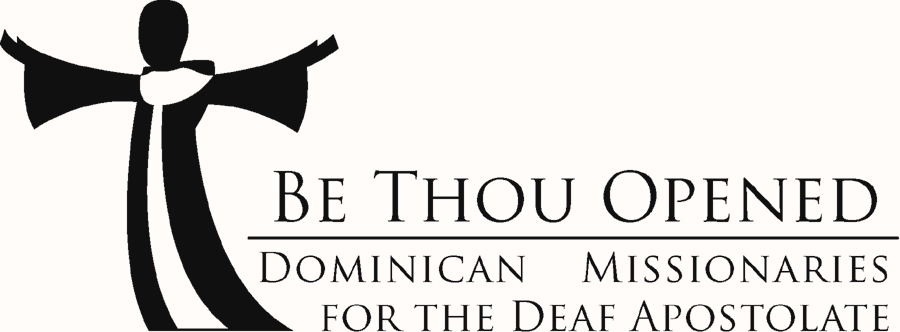Deaf Ministry of the Archdiocese of Hartford
Written by Mary Chalupsky. Originally published in the Catholic Transcript, April 2018.



When Leslie Tassie went to St. Timothy Parish in West Hartford three years ago to attend the 10:30 a.m. Sunday Mass with an American Sign Language (ASL) interpreter, it was the first time she had attended Mass in 20 years.
An ASL interpreter had left the church at which Tassie had worshipped, and since she couldn’t follow the liturgy, there was no reason, in her mind, to go back.
For many deaf Catholics like Tassie, of Bristol, celebrating Mass in her language either with an ASL interpreter or deaf priest is essential.
So when she learned that the Archdiocese of Hartford was going to revitalize its Ministry for the Deaf after a decade of dormancy, she was elated.
For the past eight years, a community of 30 to 40 deaf Catholics has attended St. Timothy Parish for a 10:30 a.m. Sunday liturgy that has offered an ASL-interpreted Mass, but they remained hopeful that they could be served by a deaf priest.
Last year, Archbishop Leonard P. Blair appointed Father Thomas Coughlin, the first deaf-born priest to be ordained in the United States, as chaplain of the archdiocese’s Ministry for the Deaf. Father Coughlin works with Deacon Dennis Ferguson, the deacon at St. Timothy’s, who, also last year, was named director of the Ministry for the Deaf.
Not only do they serve when available at the regular English-vocalized, ASL-interpreted 10:30 a.m. Sunday Mass with Pastor Alvin J. LeBlanc, but since January, Father Coughlin has celebrated a new 12:15 p.m. ASL Mass on the first Sunday of the month. That liturgy is followed by Bible study and a potluck dinner for the deaf community that meets at the parish.
For Catholics like Tassie, attending Mass, with all its nuances, is virtually impossible without the use of a sign language interpreter or, better, a deaf priest who can celebrate the liturgy in one’s own language.
Members of the deaf community are grateful for the revitalized ministry. They are quick to note that there is a significant difference between attending a Mass with an interpreter compared with a priest who signs as he celebrates.
According to Deacon Ferguson, “Going to a Mass with a deaf interpreter, as wonderful as they are, is analogous to going to a French movie with subtitles,” with nuances lost in the translation. Having a priest who can celebrate the Mass in American Sign Language is a totally different experience, he says.
Doreen Simons of Farmington, mother of two, has attended Masses without ASL. “It’s awful,” she said through the parish interpreter, Julie Colbert. “I just dream and look around the whole time.
“I don’t get anything out of it … I don’t know what’s going on,” said Simons, who is a professor of ASL studies at the University of Connecticut.
“It’s the same as if you went to an ASL Mass and didn’t know the language,” she explained. “You wouldn’t understand what they’re saying, either.”
Deacon Ferguson works from his nearby office at the American School for the Deaf in West Hartford, the first school for the deaf in the United States.
He says a group of deaf parishioners from St. Timothy Parish approached Archbishop Blair two years ago about renewing the ministry that took a hiatus 10 years ago upon the deaths of Msgr. Robert D. Bergin, chaplain, and Sister of Mercy Maura Joseph Rose, coordinator of what was then called the Catholic Deaf Apostolate.
Archbishop Blair, who was relatively new as the archdiocese’s shepherd at the time, was surprised that more pastoral outreach to deaf Catholics didn’t exist, the deacon says.
“We lost many of our deaf Catholics who drifted away,” some to other Christian communities with ASL services, Deacon Ferguson said. He noted that an ASL-interpreted Mass may attract 25 to 40 people, while signed Masses with a deaf priest draw as many as 90 participants.
At the direction of Archbishop Blair, Deacon Ferguson searched for a priest who knew sign language and had experience working with the deaf community.
“It’s a call to evangelize,” explained Deacon Ferguson. He notes that at a gathering of Catholic leaders in Florida last July, the U.S. bishops called for the evangelization of all Catholics, including those with disabilities or other impediments to their faith. The National Catholic Office for the Deaf, for example, estimates that it serves 5.7 million people who are deaf or hard of hearing.
The search ended with Father Coughlin, an internationally known priest who was ordained 40 years ago and who has spent his vocation creating opportunities for the deaf community within the Catholic Church.
“He’s just a gem,” said Deacon Ferguson, who is a lawyer and a retired director of residential services for the state Department of Developmental Disabilities. “It was a God wink that we found him.
“The community is just so grateful to Archbishop Blair for recognizing the problem and moving forward to do something about it,” he said.
A warm, approachable priest who reads lips and recently received a cochlear implant to amplify his hearing, Father Coughlin was born into a family of deaf parents, grandparents and two hearing sisters in Malone, N.Y., near the Quebec border. He attended the Rochester School for the Deaf and obtained a high school diploma from the St. Mary School for the Deaf in Buffalo, N.Y. He holds degrees from Gallaudet University and The Catholic University of America in Washington, D.C.
He was ordained to the Trinitarian Order by Cardinal Lawrence Shehan of Baltimore in 1977.
After crisscrossing the country and traveling internationally for four years as a home missionary priest for the International Catholic Deaf Association, he raised $25,000 and bought a bankrupt hotel in Old Forge, N.Y., in 1981. There, he started Camp Mark Seven, a Catholic deaf youth and adult program located on 15 acres that flourishes today. He was transferred six years later to the Diocese of Honolulu to serve the deaf.
Undaunted by the challenges and obstacles he met along the way, Father Coughlin now is the founder of the Dominican Missionaries for the Apostolates of the Deaf and Disabled, a community with 20 seminarians in the United States and other countries that, with a donation of $50,000, took its first steps toward formation as a religious institute in 2004 under the auspices of Bishop Allen Vigneron of the Diocese of Oakland, Calif.
In his Connecticut post, Father Coughlin offers sacramental, pastoral and charitable ministry to the deaf community, including baptisms, weddings, funerals, confession, Bible studies, liturgies, visits to the sick, sacramental preparation, a food pantry and retreats for deaf Catholics. Videophones, computers and other electronic devices enable him to expand his reach.
Picture
“I do a lot of counseling with people who call me from all over the U.S.,” said Father Coughlin. He plans to increase awareness of the state’s deaf community by celebrating Mass throughout Connecticut.
Among parishes in the archdiocese that also have offered ASL-interpreted Masses are St. Brigid in West Hartford and St. Jerome in New Britain, which is beginning to work with a group of Hispanic deaf parishioners.
St. Mary Parish in New Britain also offers an ASL-interpreted Mass for Hispanic parishioners. Angel Rubiñan, who was at a Mass at St. Timothy’s with his parents, who moved from Puerto Rico four years ago, said that Wanda Ortiz serves as ASL interpreter for a small community there.
“Deaf people feel more connected when they are with each other,” said Father Coughlin. He estimates that there are about 5,000 deaf Catholics in the greater Hartford area. “And most of them don’t go to church because there are no priests who can sign.”
“We hope to change that,” he said.
The Ministry for the Deaf also tries “to use audiovisual equipment to fill what is lacking in any regular Sunday liturgy services,” said Father Coughlin, since the majority of deaf Catholics can’t hear music or spoken words.
He added that he hopes the ministry will include teaching religious education to deaf students at the American School for the Deaf, especially in preparation for first holy Communion and confirmation.
Deaf parishioners agree that having a signing priest in the new archdiocesan ministry is a special gift.
“Don’t misunderstand that we don’t appreciate having an ASL interpreter,” said Simons. “But now with Father Tom, we can see him and understand what he’s saying … put it into pictures and also learn from each other.
“I realized by attending his classes that we missed a lot about the Mass and the Catholic Church all these years,” she continued. “He explained things about the sacraments that I never knew.”

Leave a Reply